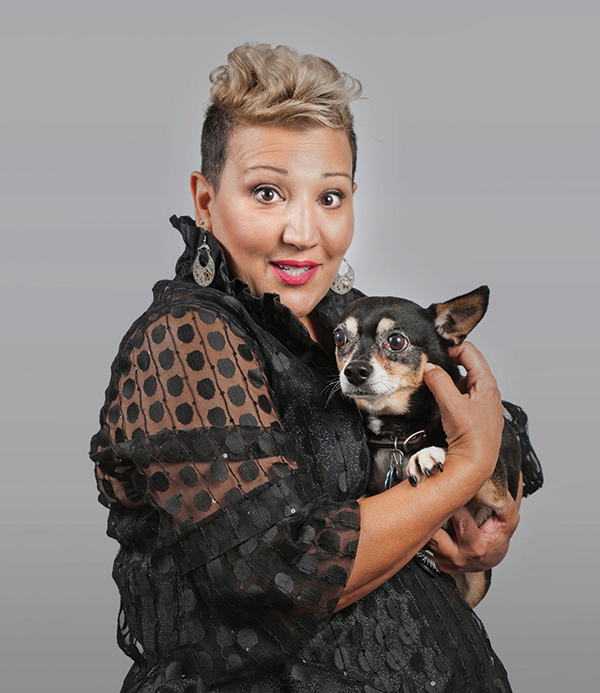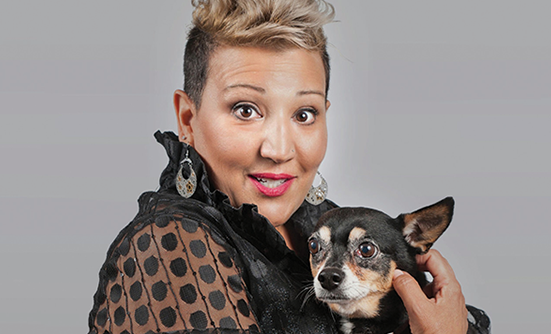During the summer of 2017, Maria Falzone, a renowned comedian and creator of a “positive sex” program for college students, walked off the stage at Pratt College after giving her “SEX RULES” talk. She’d done this program hundreds of times before, but this time was different.
Maria had felt a sense of freedom when she was out there on the stage, a sense that what came out of her mouth was more important now than ever before. Why? Because she knew that it might be the last time she would have the chance to say those things.
A Rare Cancer
Earlier in 2017, Maria was diagnosed with a rare type of cancer called cholangiocarcinoma, or bile duct (liver) cancer. Her chances of surviving more than 5 years are not good. Currently, the only treatments available for this rare cancer are chemotherapies, and when they stop working, no other options are available, although new treatments are now being investigated in clinical trials.
“I had these quiet times, when I just sat there, and I would meditate. Just being in silence and contemplation, I just came to this very peaceful place of—whatever it’s going to be, it‘s going to be,” Maria says.
After undergoing surgery to remove the cancer, Maria opted to delay having a port placed in to deliver chemotherapy, so that she could finish her lecture tour, which led her to that special night at Pratt College. When she was done with the tour, the port was placed in, and she started chemotherapy.
Obviously, the situation Maria found herself in wasn’t easy, but instead of feeling sorry for herself, she opted to count her blessings. Soon after starting treatment, Maria learned how loved she was—what she calls, “one of the gifts of cancers.” Friends from all over the country flew out to be by her side during the course of her chemotherapy.
Maria went into every infusion with a smile on her face and a joke on the tip of her tongue, but the reality of the situation was hard to escape even for her, especially in relation to her 18-year-old daughter, Natalie.
“Once I was diagnosed, it was a whole other world. I was just in my world, trying to cope as best as I could. Then everybody around me was taking care of me, so that I could do my best to take care of my daughter. But I don’t think she had the same support system that I did, if that makes sense,” Maria says. “She put her nose down, and got through it just like I did.”

“Once I was diagnosed, it was a whole other world. I was just in my world trying to cope as best as I could.”
—Maria Falzone
In January 2018, Maria finished treatment and had a huge party to celebrate with 40 of her closest friends. They ate Chick-Fil-A and danced until 2:00 a.m. All seemed right in Maria’s world, but little did she know that in just a few months she would be telling all these people that she was going to die.
Preparing for the End
At 6 months after her diagnosis, her CT scan showed 5 tumors on her liver. The cancer had returned. “You know it’s not good when your oncologist is tearing up,” Maria said.
Because of an autoimmune condition, she was not eligible for a clinical trial with a new drug, and after undergoing DNA sequencing (a type of genetic testing), Maria learned that currently there is no drug in development for her specific type of gene mutation (alteration). No treatment options were left for her. So instead of planning a celebration of the end of treatment, Maria is planning a celebration of her life.
The Last Big Celebration
“I’m actually planning a ‘wide awake,’ so I want to be there for my wake. My daughter and I joked about having a coffin there that people would have to come up to and tell me jokes, but I talked to someone who was a mortician, and those coffins aren’t comfortable, which makes sense, so I don’t think I could lay there the whole time,” she said.
“I think what I’m going to do is have people sign up for a time, like in comedy, and if they want to get up and say something, they can say it. My friend Greg, who is a comedian, will host the event, and then people can go ahead and say what they want to say, and I can hear it.”
Champagne and hors d’oeuvres will be served afterward, and Maria hopes the guests will dance into the night. “Like the last big celebration,” she says.
In addition to planning her final party, Maria has given some thought to her final moments. She’s considering a move to the desert somewhere in California—which is a “right-to-die” state—so she could be comfortable surrounded by the people she loves, when the time comes.
“Every person I’ve ever dealt with wants to be there when I die. I got to get a bigger room,” Maria jokes. In all seriousness, Maria knows she wants to spend whatever time she has left with the people she loves. That’s her ultimate happiness.
Deciding When Enough Is Enough
Despite being at peace with her situation, Maria’s oncologist recently told her about a possible new chemotherapy treatment that may extend her life. Her oncologist suggested trying it for a few months to see if it works, and if the side effects would reduce her quality of life, they could then decide if it’s worth continuing. If the treatment works, this has the potential to extend Maria’s life by several years.
“I don’t know what to do, because I just made peace with dying, and have this whole plan of what I’m going to do with what’s left of my life,” she says.
Maria hasn’t discounted doing both—continuing with her move to California and trying the chemotherapy for a few months. She still goes back and forth. Her daughter has encouraged her to do what feels right to her.
“I said, would you be okay if I didn’t do the chemo, and my daughter told me she would love to have me for 3 more years, but that I gotta to do me,” Maria says. “I said, if I don‘t do the chemo, I don’t want you to ever think it’s because I didn’t love you enough.”
Making a Difference in Life and Beyond
One thing that has helped Maria come to peace with dying is reflecting on the legacy she will leave behind. She wants to be remembered as the person who changed the statistics and the conversation around sex and sexuality. Her “SEX RULES” program has been heard by thousands of students over the past several years, and Maria has witnessed first-hand the shift in public perception of sex and sexuality.
Maria is lucky enough to have seen the impact she has had on her audience.
“I was actually at dinner a few months ago, and a girl came up to me and asked if I was Maria Falzone. She said that she saw me during my college speaking tour, and that I changed her life. I started to cry, because just recently I had been told that my cancer was back. I said, ‘Thank you. Thank you for telling me that: you have no idea what that means to me,’ and she said, ‘Thank you.’”
Maria doesn’t know what the future holds for her, or how much time she has left, but she does know that she’s made the most of the time she’s had.
“I’ve had a great life, an amazing life,” Maria says.














